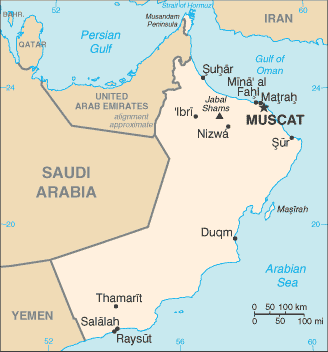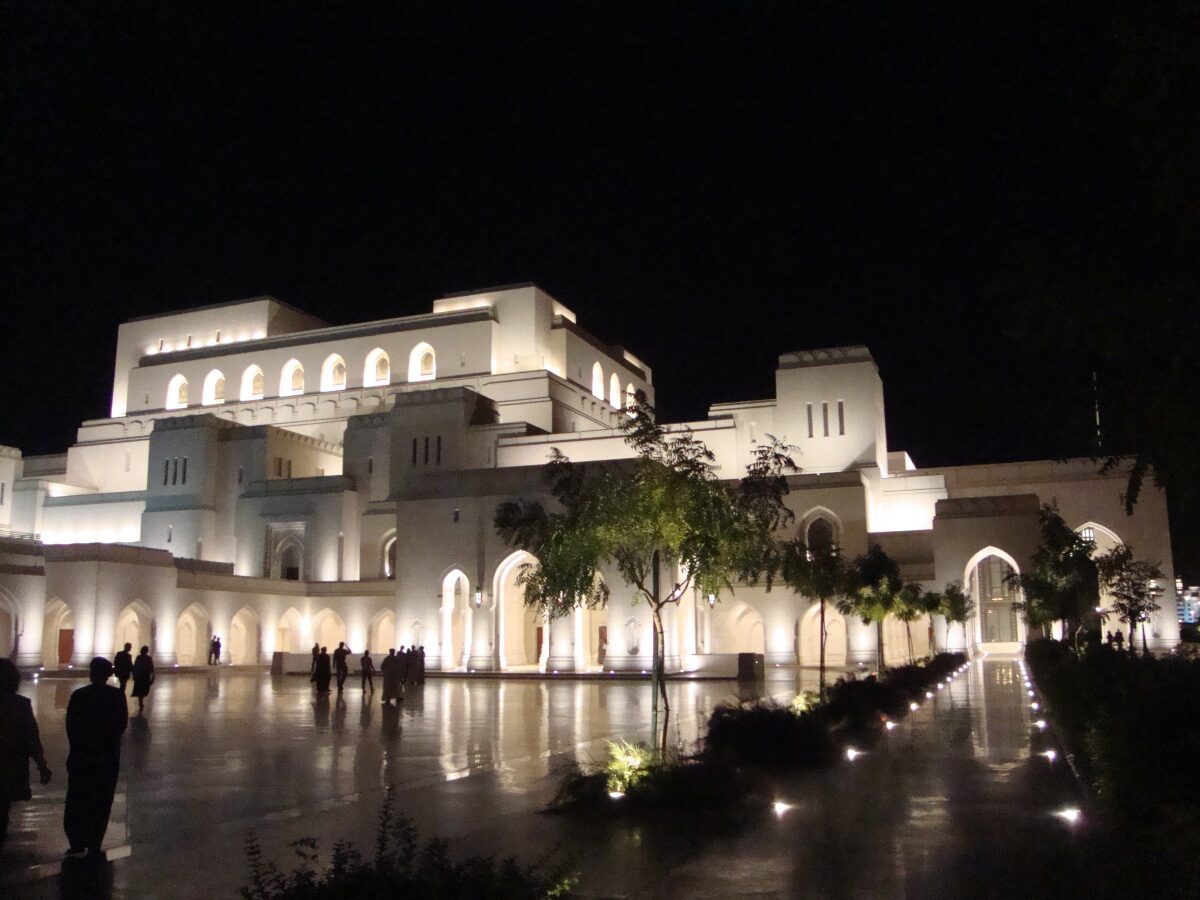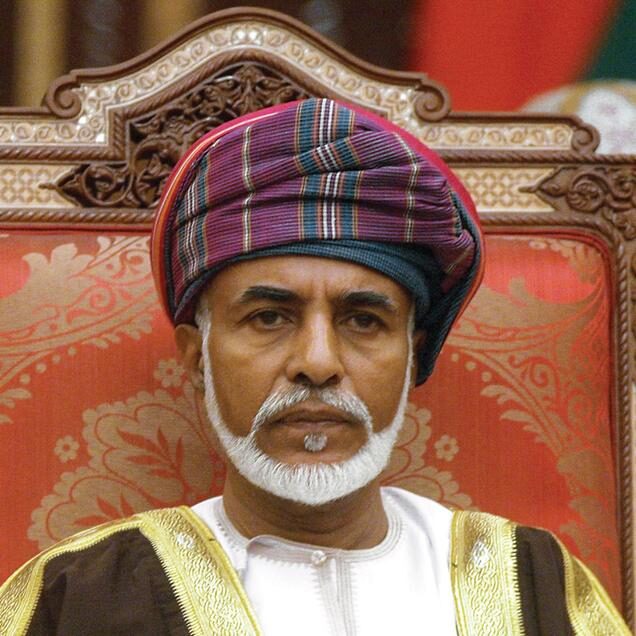OMAN AND THE SECRET OF DIVERSITY

In the Arabic peninsula, Oman is a case apart. It is not involved in the feud between Shiites and Sunnis, it doesn’t have relevant internal social problems and has a good relationships with all of its neighbors, no matter how turbulent these may be. It is not a hazard that part of the secret negotiations between the USA and Iran regarding the nuclear issue have been held in Oman, with the active participation of sultan Qaboos bin Said al Said.
People seldon speak of Oman, it is a country that is almost never in the news and, when it is, it is usually not because of the same reasons as the rest of the Middle East. Countries bicker all around Muscat, as it remains silent, strengthened by its neutral foreign policy which allows it to interact with Iran, for one.
Oman, in theory, is a small country (309.000 square km) with a limited population (a little more than 3 million inhabitants). It produces and exports oil since 1967 (in lesser quantities than its neighbors) but has the great advantage of a strategically important geographical position: it controls the strait of Hormuz (especially the deeper side, where oil tankers transit). Although only 54 km wide, the strait of Hormuz is crossed by 15 million barrels of oil every day. In other words, about 25% of world’s oil.
This gives Oman a greater relational weight than its demographic or economic size would suggest. In fact, it allows this small sultanate to move independently as far as foreign policy is concerned and to turn its strategic importance into decisional and relational weight.
The real question is: what allows Oman to be stable, alien to all regional bickering, on good terms with its neighbors, able to live and survive outside of all of the social and political conflicts that scar the Arab peninsula.
The diversity
The first reason is religious. Omanites, at least the majority of them (over 75% of the population) are Ibadites, a minoritary Islamic current that lies somewhere between Sunnism and Shiitism. It is a moderate version of Islam with a strong ethic social sense and is free of the extremist approaches that surface from the other theological schools. This circumstance is reflected in Oman’s foreign policy, which is personified in the religious role and absolute temporal power of the sultan Qaboos bin Said al Said.
The second reason is in the role of the sultan Qaboos. Qaboos rose to power on July 23rd 1970 after ousting his father (later exiled in the UK) with a non-violent coup d’etat (with UK support). After becoming sultan, Qaboos immediately gave his reign a modern social and economic footprint. With the strength of its oil fields, Oman managed to do away with its conservative isolationism while keeping the same structure of absolute powert which, despite the look and feel of a moderate libertarism, is so far unaltered.
The peculiar profile of Oman has made it so that the so-called Arab Spring, which has brought about social upheavals in many countries of the Arab peninsula, in the Middle East and North Africa, has left the small Gulf state substantially unaltered. After limited protests in 2011, the sultan promised – and enacted – economic reforms and has introduced economic benefits for those without a job and further political rights. The social upheaval was averted with but a partial use of repression.
One of the principal characteristics of Qaboos is the pragmatism with which he administers the country. The sultan studied in Indian schools then, at the age of 16, was transfered to British ones. He went to the military academy of Sandhurst, where he served in the British army. He has traveled the world, is a man of a profound culture, a lover of classical music (he created a symphonic orchestra which he personally administers), he writes music, plays the organ and the lute. Sultan Qaboos is not, like many of his neighbors, a rich and illiterate beduin who cannot keep up with progress. His qualities are recognized even by the other leaders of the Arab world.
Another characteristic of Oman is its culture, history and the traditions of its people. The majority of Omanites are not of beduin or nomad extraction (as most of their neighbors are). They are seafaring people. They have colonized the African coasts (Zanzibar was under their control). They profited from trade in the Indian Ocean (unlike the United Arab Emirates, where pirates prevailed) and have always been open to the outside world. This has allowed the Ibadite monarchy to remain independent since 1650, once the Portuguese were chased away from the country. It’s autonomy was but partially scathed in 1891 when Oman became a British protectorate, up to its independence in 1951. Relationships with the UK have remained good, as have those with the US.

The royal opera house in Muscat
Internal policy and freedom
Internally, Oman isn’t much different from the neighbouring regimes. It is an absolute monarchy which, despite the ample vision of the sultan, offers little room to participated democracy or civil rights. Even in this Oman is different from nearby countries.
Despite the 1996 law which makes Islam the State religion, other religions have the right to keep and administer their shrines. There are some limitations to proselitism, one must register at the Ministry of Religious Affairs and, of course, it is prohibited to create any turmoil or disturb the public order.
Speaking of women’s rights, it is sufficient to say that women represent about 30% of manual labor in Oman. They serve as ministers, have the right to vote and are represented in the State Council. The comparison with nearby Saudi Arabia, where they are still debating whether or not to allow women to drive a car and where only today a partial voting right for women has been introduced, is quite emblematic. Literacy among the population is quite high: over 90% for men and over 80% for wormen.
On the political level, although keeping power fast in his grip – from the power of the government’s foreign and economic policy to the judicial system and the armed and security forces – Qaboos has tried, from time to time, to obtain a certain degree of popular consensus. The Shura (consultative assembly), a structure which is typical of the Ibadite culture, has been gradually modeled according to the popular instances and circumstances.
Presently the Omanite parliamentarian system is based on a Council of State (Majlis al Dawla) which is designated by the Sultan and on a Majlis al Shura elected by universal suffrage for men and women over 21. Laws, which can be proposed in the above councils – although limited to the economic and social sectors – need nonetheless the final approval of the Sultan.
Political parties are of course illegal, the right to assembly and association are limited, the press is scrupulously overseen (although private radios and Tv’s have been authorized to exist since 2004), the internet is meticulously controlled and the judges of the Supreme Court are designated by the Sultan. Nothing can be done without the consent of the Sultan, the regime is absolute and authoritarian but compared to theh other Middle Eastern countries and thanks to the good sense of the Sultan, Oman is a “happy island” in the Persian Gulf.
The proof of this is that in Oman there is no terrrorism (despite the nearness to countries where terrorism exists) and the attempts – modest at most – of opposition to the Sultan by Islamic groups date to 1994 and 2005. The last attempt at insurrection against the central authrities of Muscat dates back to the communist rebellion in the region of Dhofar, near the border with Yemen, between 1965 and 1975, a problem inherited from Qaboos’ father (whom he deposed) which was solved thanks to the military support of the Shah of Persia, the King of Jordan and by teh UK. Even then, once the rebellion had been drowned, Qaboos granted an amnesty to the rebels and invited them to join the armed forces.

Sultan Qaboos
The asset of foreign policy
The substantial difference between Oman and the other countries in the Middle East is mostly in its foreign policy. Oman resides within the US sphere of inflence and protection but, unlike the other countries that dwell there, it manages to without hurting Iran’s susceptibility. On the one side there are accords, which have been renewed through time, between Muscat and Washington, in virtue of which the US armed forces use Omanite air and naval installations (Thumrait and Masirah) in which they stock armaments and provisions. On the other side, Muscat and Teheran have signed a security agreement (August 4, 2010) which includes, among other things, joint military training. A preceding agreement from 2009 also included the cooperation in the fight against countraband in the Gulf of Oman.
The characteristics of Omanite foreign policy can be summarized in three words: pragmatism, non-alignment (but good neighborood relations) and non-interference with foreign issues, which means neutrality. There exist no ideological militancy in prepackaged formations but a lot of diplomatic transgression based on strategic evaluations. Time and again, Qaboos sides with those that he thinks are right.
In 1979, when all of the Arab countries opposed to the Camp David accords between Anwar Sadat and Israel had suspended diplomatic relationships with Egypt, Qaboos, distancing himself from the opinino of the Arab League, had not.
When the more conservative countries refused to start relationships with the Soviet Union and China, Qabbos was the first to do so. Then, when the USSR invaded Afghanistan, Oman immediately signed an agreement with the US to let them use Omanite bases (the nearby nations, which were then contrary, finally conceded their bases in 1993 and 2003, during the war against Iraq).
When all the neighbouring countries were against Israel, in December 1994 Qaboos was the first Arab leader to receive an official visit from the Israeli Prime Minister Yitzhak Rabin. The visit was reiterated by Shimon Peres in April 1996. In 1995 Oman and Israel had opened bilateral commercial offices (which were then closed due to the intifada) and there was never any boycotting on the part of Qaboos against Tel Aviv.
When the nearby countries all supported the Sunni regime in Bahrain against the Shiite rebellion of March 2011, Qaboos’ Oman also gave his verbal support, like the rest of the Gulf Cooperation Council countries, but without sending his troops over.
When the international military intervention against Muammar Khadafi’s Libya was taking place, Oman stayed neutral and did not offer any support, neither military nor financial, to the rebels. Once the war was over, Qaboos immediately recognized the legitimacy of the National Transition Council. This was not a change in his political line as he soon gave asylum to the wife and children of Khadafi until October 2012. There was an international arrest warrent issued by Interpol against Aisha and Hannibal Khadafi, but Qaboos refused to turn them over.
Oman stays clear of the Syrian issue as well. It neither supports the regime, nor the various rebel factions (even though in November 2011 he voted to oust Bashar al Assad from the Arab League and closed Oman’s embassy in Damascus on the following year). Qaboos surely does not arm or finance anyone there.
Muscat is a veiled critic of the Shiite administration of Baghdad, Iraq, even though he participated in teh liberation of Kuwait in 1990. Oman stays clear of Afghanistan (while they offer their military installations to the US), keeps a historical diffidence with Yemen, but nothing more (he avoids, for instance, supporting the Huiti minority which dwells near the border with Oman and opposes the regime in Sana’a).
In the past, Oman has had slight relational problems with the United Arab Emirates because of some territorial disputes near the border between the two countries (such disputes were settled in 2008 after 10 years of negtiations) and because of political divergence. Lately, the arrests of respective spies operating in the two countries have caused some further frictions.
But, as we mentioned, the Omanite diplomatic masterpiece is in their relation with Iran. Sultan Qaboos saw eye to eye with the Shah and had no trouble getting along with the ayatollahs as well. He facilitated the contacts between Washington and Teheran, he mediated on the nuclear issue and negotiated between the sides even for the liberation of the Americans imprisoned in Teheran. Good neighborhood relations allowed Oman to administer and develop oil installations together with Iran. The risibly small number of Shiites on its national territory plays in Oman’s favor.
The other pillar of Omanite foreign policy is its participation in teh Gulf Cooperation Council (GCC). In this case too, Muscat has on the one side sponsored military and economic integration but at the same time – Oman’s opposition just a few weeks back against Saudi Arabia’s integration attempt – wants to keep his independence and keep clear of the sectary or interventist Middle Eastern policy of the other GCC countries.
The problem of succession
The problem with Oman does not lie in its present, but in its future. Any absolute monarchy feeds from the continuity with which it exercises his power. In Qaboos’ case, there will be no continuity after him. The Sultan is now 74 years old, he is not married (he was married briefly in 1976 with a cousin, but the two soon divorced). He has no children and thus no heirs.
When Qaboos dies, he should theoretically be succeeded by a male from within the royal family, which presently counts Qaboos’ three sisters, his father’s various brothers and their children. Theoretically, the first in line are the three male children of his defunct uncle Tariq Bin Taimur al Said. Their names are Assad, who is the personal representative of the Sultan, Shihab, who is a retired admiral, and Haytham, who is a Minister. Qaboos has willingly refused to designate his heir because, apparently, none of the candidates share his political caliber and charisma.
The Omanite constitution says (article 6) that at the death of the Sultan, the royal family will unite and designate the successor within 3 days. If a decision cannot be reached, then the military defense council, the heads of the Supreme Court and the heads of the two branches of “parliament” will meet and open an envelope. In the envelope, the dead Sultan will have designated one or two candidates to replace him. This allows the Sultan to avoid a dynastic feud while he is alive, without guaranteeing the advent of one after his death.
Tweet
